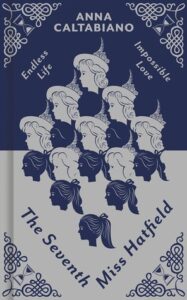 The Seventh Miss Hatfield, Anna Caltabiano
The Seventh Miss Hatfield, Anna Caltabiano
I didn’t know much about this book or author before I started the book — I’d seen the books around a bunch and ended up just getting it from the library on a whim. I’m really not impressed, and I’m actually giving up without finishing the book, so you should take that for its worth in considering the book itself!
The book opens with a mysterious little scene in which a young veiled woman is thwarted at an auction in obtaining a painting she wants. The first chapter then appears totally unconnected in time (and possibly in place as well), as a young girl called Cynthia plays on the front porch of her parents’ house and goes over to deliver a parcel to their mysterious new neighbour, a Miss Hatfield. Miss Hatfield invites her in for lemonade and cookies, and trying to be polite, Cynthia goes in. Very quickly, she’s aged up to being an adult (apparently gaining more vocabulary as she does so — anyone bothered explaining to Caltabiano that language is acquired by exposure, not simply age?) and given something that makes her immortal. She’s told that she’s the seventh Miss Hatfield, an immortal and unhappy group of women blessed with immortality, and cursed to leave behind their lives. Almost immediately after that, despite her resentment, Cynthia is sent out to retrieve — aha! — the painting mentioned in the prologue.
Although things happen quickly, it doesn’t feel fast-paced. Instead, it feels like the kind of story a child tells: this happened and then another thing and another thing and then this and then another thing and and and and… The explanations barely hang together, and what could be fascinating (for example, the clock) is skimmed over. Cynthia is shockingly accepting of her fate, and does things whether they make sense or not. For example, she’s mistaken for being someone’s granddaughter and just… plays along, feeling trapped because… I don’t understand why.
The story has very little internal logic and doesn’t hang together well, and then, worse, Cynthia ends up in a romance. This is an 11-year-old girl who has just been aged up using vague magic means, adding barely hours to her sum total experience of the world (for all that Caltabiano seems to think that will automatically improve her vocabulary and make her an adult). Romance is not at all appropriate, geez.
So here’s where I get off. This book and the sequels are being summarily handed back to the library without me bothering to read a single word more.

Sounds like a book to avoid. Not that this one was ever on my radar, but now I know …
Yeah, I wouldn’t recommend it…